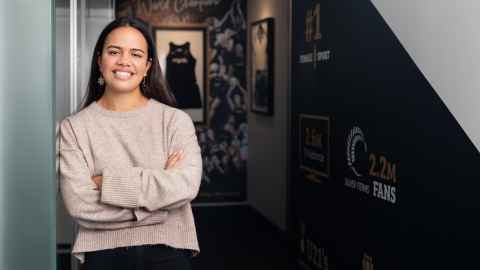Communication internship programme
Apply now for Semester One, 2026: Applications close on 28 November 2025.
The Communication internship programme gives third-year BA and BC students an opportunity to gain real-world workplace experience as part of their degrees.

Get ahead before you graduate
Students accepted to the Comms307 internship programme will complete an internship in the workplace. You’ll take on a set project for the organisation and complete accompanying university coursework.
The programme operates as a standard, 15-point course and is a valuable opportunity to gain workplace experience, make connections and develop professional skills.
As a first step check out our available projects page. If you see an internship project you’re interested in, complete an application.
If you don’t see anything that interests you, you can seek out other opportunities or internships that could be credited towards this course. There may be an organisation you’d particularly like to work with, and you can reach out to them and see if they have options that could work for the course.
You’ll need to ensure you organise an unpaid, 80-hour, supervised project. Your potential supervisor can contact us for details.
How does the programme work?
- Worth one 15-point course at Stage III – it will be credited as COMMS 307 for Communication students
- Work required:
- 80-hour project in the workplace.
- 10–12 hours of coursework (in-person in weeks 1-3 and Zoom in weeks 6, 10 and 11).
- Internship projects come from a range of industries, including media, public relations, advertising, broadcasting, and corporate communication, NGOs and charities.
- Enrolment numbers are limited, and not every student will be accepted. See the application process below for more details.
Internships may not follow the usual University calendar, so students accepted into the programme will work out a project timeline with your workplace mentor and the course organiser. You might complete the project during the breaks instead of during the semester, go into your organisation 1-2 days a week for a longer period of time, or work for a shorter, more intensive block.
How does the application process work?
Applying
- Find an internship you’re interested in. You can browse available projects here or reach out to organisations yourself. If organising your own project, please download and send your potential supervisor/mentor our one-page course brief and write them an introductory email explaining why you want to take on a project with them and what you have to offer.
- Once you’ve chosen a project, put together a CV specific to that opportunity. This CV must come to us first for review. Do not send it directly to any of our current partners.
- Complete the online application, including submitting your CV.
- You will find an example CV in the section below. We will give you one round of feedback on your CV and send your 2nd version to our contact in the organisation. It will be up to our contact to decide whether to interview you on the basis of your CV.
If your application is accepted
- You’ll be invited to a pre-course session (on Zoom), where you’ll deliver a 2-minute pitch for your chosen project (even if you’re organising your own project).
- Once you’ve completed the session and the course coordinators are happy with your pitch and CV, they’ll send your application to the organisation.
- The organisation will arrange an interview with you.
- If the interview is successful, you’ll be formally enrolled in CAREER 300/COMMS 307.
What are the benefits?
- A range of new skills to boost your employability and enhance your CV
- Real-life workplace experience in your area of interest
- Connections – building a network of professional contacts
- References for future job applications
- A portfolio of work (e.g. pieces of writing, videos produced, social
media campaigns) - Feedback and practice around CV-writing and interview skills
- The possibility of employment (part-time or full-time) with your chosen
organisation. The organisations often use this experience to select high
performing grad employees